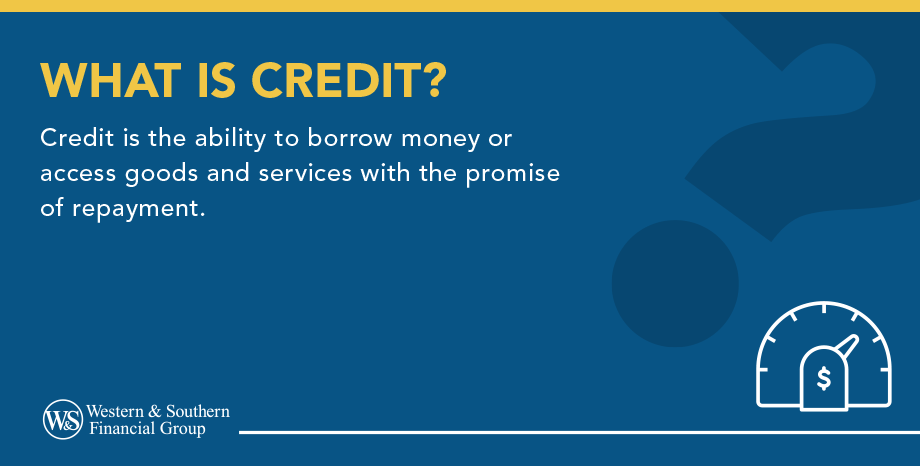

Key Takeaways
- Credit is the ability to borrow money or access goods/services with the promise of future payment.
- Your credit score significantly impacts loan approvals, interest rates, and other financial opportunities.
- Understanding the factors influencing your credit score enables you to make informed financial decisions.
- Responsible credit management, including on-time payments and low credit utilization, is crucial for building good credit.
- Regularly monitoring your credit report helps identify errors and help protect against fraud.
In this guide, we’ll break down the importance of credit, its benefits, risks, and best practices for responsible credit management.
What Is Credit?
The definition of credit is the ability to borrow money or access goods and services with the understanding that you’ll pay later. It is extended by lenders, such as banks, credit unions, and credit card companies, based on your financial trustworthiness. Your credit history, income, and overall financial behavior determine your creditworthiness.
Types of Credit
There are three common types of credit:
- Revolving Credit – Credit cards and lines of credit where you can borrow, repay, and borrow again up to a limit.
- Installment Credit – Loans such as mortgage loans, car loans, student loans, and personal loans that require fixed monthly payments over a set period.
- Open-End Credit – Utility bills or charge cards where the balance must be paid in full each month.
Why Credit Matters
Credit plays an important role in personal finance, affecting everything from loan approvals to interest rates and even job opportunities. Your credit history and score can influence many aspects of your financial life, including:
- Loan and Credit Approvals – Lenders check your credit score to determine eligibility for loans and credit cards.
- Interest Rates – A higher credit score may result in lower interest rates on loans and credit cards, saving you money.
- Employment Opportunities – Employers sometimes review credit reports during the hiring process.
- Rental Applications – Landlords may assess your credit to decide if you're a reliable tenant.
- Insurance Premiums – Insurance companies sometimes use credit scores to determine premium costs.
What is a Credit Report?
A credit report is a detailed record of your credit history compiled by credit bureaus. It includes information on your credit accounts, borrowing history, payment history, outstanding balances, and public records such as bankruptcies or foreclosures. Lenders, landlords, and utility companies use credit reports to assess your financial reputation.
Your credit report consists of several key components:
- Personal Information – Name, address, Social Security number, and employment history.
- Credit Accounts – Details of all credit accounts, including the type of credit, credit limit, balance, and payment history.
- Credit Inquiries – A record of who has accessed your credit report, including hard inquiries from lenders and soft inquiries from personal or promotional checks.
- Public Records and Collections – Information on bankruptcies, tax liens, and accounts in collections.
Reviewing your credit report regularly helps identify errors, detect fraud, and take corrective action if necessary. You can receive a free annual credit report from the three major credit bureaus: Equifax, Experian, and TransUnion.
Understanding Your Credit Score
Your credit score is a three-digit number that represents your creditworthiness. By assessing lending risk, lenders use this score to evaluate loan eligibility and interest rates. A higher score suggests financial responsibility, making you a more attractive borrower.
The most widely used credit scoring model is FICO, which ranges from 300 to 850. Here’s how credit scores are generally categorized:
| Score Range | Category Rating |
|---|---|
| 800-850 | Excellent Credit |
| 740-799 | Very Good Credit |
| 670-739 | Good Credit |
| 580-669 | Fair Credit |
| 300-579 | Poor Credit |
Factors Affecting Your Credit Score
Your credit score is a key financial indicator, and understanding what influences it can help you make better financial decisions. Credit bureaus calculate your score based on several major factors:
- Payment History (35%) – Making payments on time improves your score, while missed payments hurt it.
- Credit Utilization Rate (30%) – Using too much of your available credit can lower your score.
- Length of Credit History (15%) – The longer your credit history, the better.
- Credit Mix (10%) – Various credit types (loans, credit cards, etc.) can be beneficial.
- New Credit Inquiries (10%) – Too many recent credit applications can temporarily lower your score.
How to Build and Maintain Good Credit
Building and maintaining good credit requires diligence and financial discipline. Here are some practical ways to develop and maintain a strong credit profile:
- Pay bills on time – Set up automatic payments to avoid missed due dates and establish a positive payment history for on-time payments.
- Keep credit card balances low – Aim to use less than 30% of your credit limit.
- Monitor your credit report – Check your credit reports regularly for errors and fraud.
- Avoid opening too many accounts at once – Having too many new accounts can hurt your score.
- Diversify your credit mix – A mix of installment and revolving credit can improve your score.
Common Credit Mistakes to Avoid
Managing credit wisely is important for financial stability. Are you making these common credit mistakes? Many individuals unknowingly fall into credit traps that can have a negative impact on their scores and financial health. Below are some mistakes to be aware of and avoid:
- Maxing Out Credit Cards – High utilization can lower your score and make debt repayment difficult.
- Missing Payments – Even one late payment can significantly impact your credit.
- Closing Old Accounts – Reducing the length of your credit history can harm your score.
- Applying for Too Much Credit – Several hard inquiries in a short time can lower your score.
How to Repair Bad Credit
If your score is low, you can take steps to help rebuild your credit over time:
- Pay Down Debt – Reduce credit card and loan balances by paying more than the minimum payment.
- Negotiate with Creditors – Request lower interest rates or payment plans to stay on track.
- Dispute Errors on Your Credit Report – Contact credit bureaus to correct inaccuracies.
- Become an Authorized User – Being added to a responsible user’s credit card can help improve your score.
- Use Secured Credit Cards – These cards require a deposit but can help build or repair credit.
Final Thoughts
Credit is a powerful financial tool that can open doors when managed responsibly. You can build a strong financial foundation by understanding how credit works, maintaining good credit habits, and avoiding common pitfalls. Take proactive steps today to monitor and improve your credit, helping ensure long-term financial success.
Build solid personal finance habits for long-term success. Get My Free Financial Review
Frequently Asked Questions
What is the purpose of credit?
Is having credit important?
Sources
- Credit Reports and Scores - Consumer Financial Protection Bureau. https://www.consumerfinance.gov/consumer-tools/credit-reports-and-scores/
- Understanding Your Credit - Federal Trade Commission. https://consumer.ftc.gov/articles/understanding-your-credit
- Credit Reports and Scores - U.S. General Services Administration. https://www.usa.gov/credit
- Credit Scores - Federal Trade Commission. https://consumer.ftc.gov/articles/credit-scores
- Breaking Down Your FICO Score - Debt.org. https://www.debt.org/credit/report/scoring-models/fico-score/
- What is a FICO Score - Fair Isaac Corporation. https://www.myfico.com/credit-education/what-is-a-fico-score
- What's in my FICO® Scores? - Fair Isaac Corporation. https://www.myfico.com/credit-education/whats-in-your-credit-score












